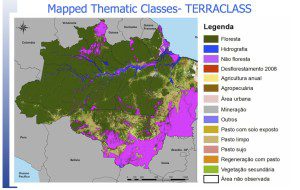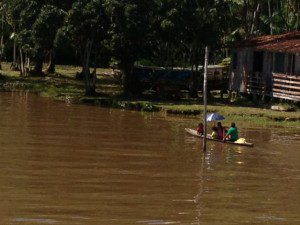A long overdue post from Brazil. I’ve been here about two weeks, first in Rio and have just concluded the second week in the Amazonian city of Belém. I hope to come back with more substantive thoughts about the country’s direction, but here are some preliminary thoughts. The Brazilians we met were somewhat ambivalent about the World Cup. Many of them expressed the concern that this was a lot of money that the country could have used to address its myriad social needs.
When I think about whether Brazil can be a major player internationally, even more important than it is now, I’ve generally been struck by the contrasts, between the rich cosmopolitan parts of Rio and the rougher, grittier favelas that intersperse the city. Similar contrasts abound between the Rio’s relatively nice beach neighborhoods (like Ipanema) and Belém. Belém looks like it has seen better days since the time when it was a major port city exporter of rubber. The agencies and individuals we met with here have treated us with great kindness and generosity, but the city itself has aging infrastructure, cracked sidewalks, inadequate sewerage, and a fair amount of garbage.
At the same time, Brazil has vibrant and ambitious public and private sector projects. Its state-owned pharmaceutical company Farmanguinhos produces generic antiretroviral drugs to serve the domestic market. Its National Institute for Space Research (INPE) generates sophisticated maps of deforestation to protect the rainforest. Private sector firms like the mining company Vale are among the largest in the world and have massive mining projects in different countries. Even Petrobras, the state-owned oil company which has been in the news of late for all the wrong reasons, has ambitious plans to raise money to exploit massive off-shore oil reserves.
Brazil, given its aggregate economic size, is inevitably going to be a major player this century. The immense forest reserves in the Amazon, which cover 3/5 of the country, make Brazil a central player for global climate change as the forests are a huge store of carbon. The country’s leadership has ambitions to be a major player internationally, but I’m left with a nagging sense that the drag of Brazil’s domestic challenges, the poverty and violence in urban slums and the poor Northeast and Amazon will drag down the country from being able to be as influential as the country’s leadership might otherwise desire.
Everywhere you look here you see a lot of needs for basic human development. I’m sure visitors to India see similar contrasts. In any case, I hope to say something more substantive about the issues we’ve been exploring here, but this is a start.
Joshua Busby is a Professor in the LBJ School of Public Affairs at the University of Texas-Austin. From 2021-2023, he served as a Senior Advisor for Climate at the U.S. Department of Defense. His most recent book is States and Nature: The Effects of Climate Change on Security (Cambridge, 2023). He is also the author of Moral Movements and Foreign Policy (Cambridge, 2010) and the co-author, with Ethan Kapstein, of AIDS Drugs for All: Social Movements and Market Transformations (Cambridge, 2013). His main research interests include transnational advocacy and social movements, international security and climate change, global public health and HIV/ AIDS, energy and environmental policy, and U.S. foreign policy.




0 Comments
Trackbacks/Pingbacks